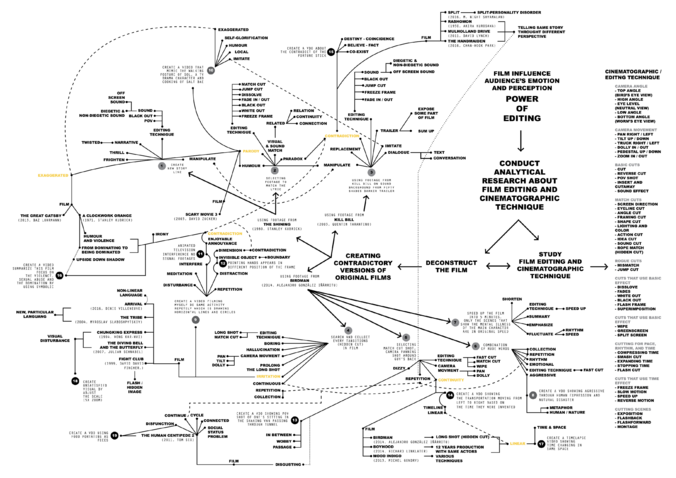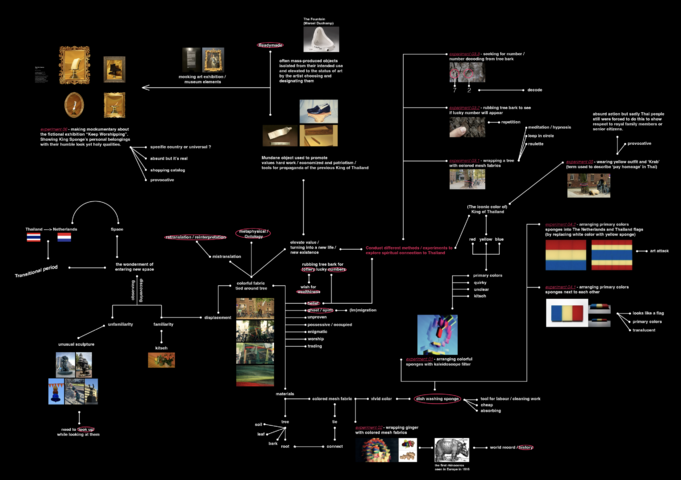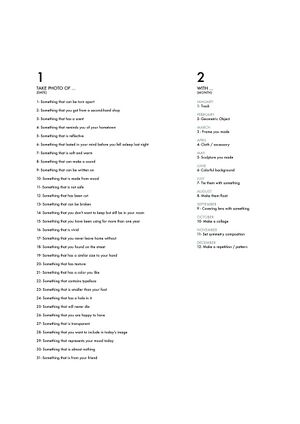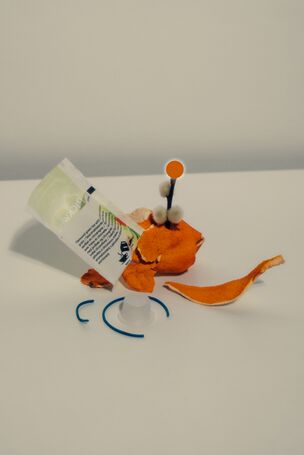Text on Practice - Te: Difference between revisions
Taaaaaaaaeto (talk | contribs) mNo edit summary |
Taaaaaaaaeto (talk | contribs) mNo edit summary |
||
| Line 5: | Line 5: | ||
I am studying Lens-based Media in the Netherlands, which is situated over 9,000 kilometers away from my home country, Thailand. Distance is not just physical. It's also evident in how people from different cultures believe and interact. While exploring new things, I encountered a familiar symbol that inspired my EYE project: a tree adorned with colored meshes that reminded me of a spiritual belief in Thailand. Spirits are believed to dwell in massive, old trees with unique shapes. As a sign of respect, people tie colored meshes around the trees and even rub the bark, hoping to find lucky lottery numbers. I agree with the Thai filmmaker Apichatpong Weerasethakul, who once said in the Guardian interview, "My country is run by superstition." This motivated me to explore different experiments to connect with my motherland spiritually. | I am studying Lens-based Media in the Netherlands, which is situated over 9,000 kilometers away from my home country, Thailand. Distance is not just physical. It's also evident in how people from different cultures believe and interact. While exploring new things, I encountered a familiar symbol that inspired my EYE project: a tree adorned with colored meshes that reminded me of a spiritual belief in Thailand. Spirits are believed to dwell in massive, old trees with unique shapes. As a sign of respect, people tie colored meshes around the trees and even rub the bark, hoping to find lucky lottery numbers. I agree with the Thai filmmaker Apichatpong Weerasethakul, who once said in the Guardian interview, "My country is run by superstition." This motivated me to explore different experiments to connect with my motherland spiritually. | ||
During a thematic seminar, "Is it possible to talk about power and violence without showing their depictions?" led by Cihad, I | During a thematic seminar, "Is it possible to talk about power and violence without showing their depictions?" led by Cihad, I read an article from Nermin Saybasili, who proposed the idea of visibility as a complex system of permission and prohibition of presence and absence, which always contains apparitions and often obligates blindness" (Saybasili, 2008, p. 302). This encouraged me to create artwork addressing the Thai monarchy's role and power dynamics, using the concept of visibility to explore how the monarchy controls and shapes public perception. | ||
Revision as of 09:40, 12 March 2023
Displacement and the attempt to relive my life in my hometown.
I am studying Lens-based Media in the Netherlands, which is situated over 9,000 kilometers away from my home country, Thailand. Distance is not just physical. It's also evident in how people from different cultures believe and interact. While exploring new things, I encountered a familiar symbol that inspired my EYE project: a tree adorned with colored meshes that reminded me of a spiritual belief in Thailand. Spirits are believed to dwell in massive, old trees with unique shapes. As a sign of respect, people tie colored meshes around the trees and even rub the bark, hoping to find lucky lottery numbers. I agree with the Thai filmmaker Apichatpong Weerasethakul, who once said in the Guardian interview, "My country is run by superstition." This motivated me to explore different experiments to connect with my motherland spiritually.
During a thematic seminar, "Is it possible to talk about power and violence without showing their depictions?" led by Cihad, I read an article from Nermin Saybasili, who proposed the idea of visibility as a complex system of permission and prohibition of presence and absence, which always contains apparitions and often obligates blindness" (Saybasili, 2008, p. 302). This encouraged me to create artwork addressing the Thai monarchy's role and power dynamics, using the concept of visibility to explore how the monarchy controls and shapes public perception.
Monarchy, Propaganda, and the Attempt to Subvert power.
King Rama IX, the former monarch of Thailand, was depicted as a god-like figure and the father of all Thai citizens. This portrayal was reinforced through official media channels, frequently featuring images of the King's humble possessions and dedication to the country. The purpose of this propaganda was to promote the values of hard work and patriotism. Although the current King has been unable to establish a positive public image since his father's reign almost seven years ago, Thai citizens are still obligated to respect the monarchy and its members. The Thai government has used the Lèse-majesté law, also known as Section 112 of the Thai Criminal Code, as a political weapon to suppress the freedom of speech and expression of Thai citizens. They have jailed many activists for criticizing the monarchy. This mirrors the problematic nature of power in the monarchical state, as Foucault (1995, p. 80) highlighted, "This dysfunction of power was related to a central excess: what might be called the monarchical 'super-power', which identified the right to punish with the personal power of the sovereign." Despite this happening in Thai society, some hyper-royalists still hold unwavering faith in the monarchy's impartiality, prompting the question, "Does it make sense to believe and revere something blindly?"
The experience of living in a suppressive society has instilled in me a desire to create art that subverts power and challenges the status quo. Ai Weiwei's "Study of Perspective (1995-2017)" portrays the artist giving the middle finger to historical buildings, landmarks, and public spaces that have been transformed into symbols of power. This inspired me to examine the symbolism behind historical buildings and landmarks. I am fascinated by the media's ability to manipulate object perception and Marcel Duchamp's 'Readymade' art, which presents mass-produced objects as art. This has led me to explore the concept of offering mundane objects with a sense of holiness, which requires a shift in mindset to appreciate.
If anything could be art, why can't the cheap sponge? I chose the sponge as the primary object due to its symbolic association with poverty, and its yellow color corresponded to the Thai King's iconic color.
Recent work
Finally, I created a mockumentary film titled "The Holy Sponge." It features a fictional exhibition trailer for "Keep Worshipping" that will be held at the EYE Filmmuseum in April 2023. The exhibition highlights the holy qualities of items that the King Sponge owned and used to develop the Coconut Shell Planet. The items shown in the film are influenced by the iconic belongings of the previous King of Thailand released by official Thai media to reflect the King's philosophy of the sufficiency economy. As well as the stories behind them also inspired the script, such as his limited use of twelve pencils per year and his ability to squeeze toothbrush tubes to their fullest potential effectively. To parody the cliché idea of the King of Thailand as a god, I add aspects of the fairy tale and surrealism into the script's narration. For instance, any texts, plans, or wishes written by The Holy pencil will become real, and the Holy Money can automatically duplicate itself at midnight.
The production process involved filming selected objects on a shiny silver stand against a moving golden-yellow fabric background, utilizing a high frame rate to achieve a surreal and magnificent effect. The filming approach was intended to blend commercial packshot and exhibition elements to elevate the value of mundane objects.
In the post-production process, the items were edited into golden frames to convey their high value and displayed with museum-style labeling to enhance the exhibition concept. I used particle animation in some shots to create a luxurious feel and added cartoon sound effects to inject a sense of humor. The narration was done by a Thai voiceover using an AI voice generator to create the effect of propaganda and the overwhelming amount of information frequently distributed to the public.
Fisher (2014, p.125) reminded us, "Home is where the haunt is." Idealized memories of the King constantly haunted me. Creating this work was a relieving experience since mocking the King is not permitted in my hometown. I'd appreciate showcasing it here, but I won't be jailed.
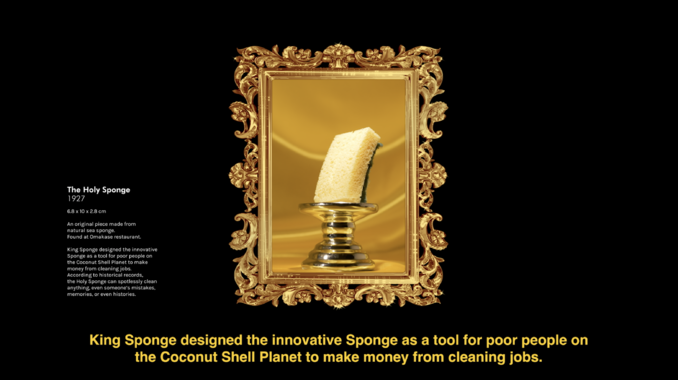
Relation to previous practice
The Holy Sponge aims to blur the line between reality and fiction, as was explored in my 2017 experimental film "Turning Tide and Cataract," which was my bachelor's thesis project. The film utilized the concept of "meta-cinema" to make the audience aware that they were watching a representation of reality rather than reality itself. By embracing this idea, the audience was invited to question their perception of reality and the influence of the media on it.
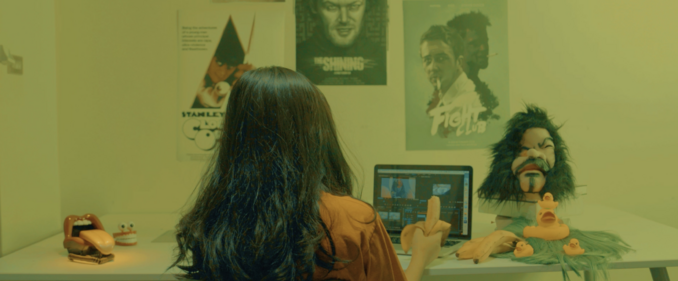
The film has no dialogue. It follows a senior female student spending her day editing a project at home, only to be interrupted by discovering a mysterious suitcase. Divided into three parts, the film explores the concepts of "Continuity," "Disturbance," and "Exaggeration" in an ironic and subversive way through the use of various filmmaking techniques, including Mise-en-scene, editing, and sound.
My process involved analyzing award-winning and recommended films, researching film editing and cinematography techniques, and creating a mind map to document the terms that inspire me as a starting point and expanding upon them. I usually create mind maps for almost every project because this writing practice enables me to visualize my thought process, gain an overview of my work, and identify connections between the different directions I am exploring.
Ongoing Work
"Something that" is the current project I'm working on. Each day, I have challenged myself to create a subject to capture that aligns with the monthly theme. For instance, on the first day of each month, I shoot a photo of something that can be torn apart. In January, I focused on photographing trash, resulting in a photoshoot where I combined a torn-apart object with garbage.
I adopted the idea from the "Scratch Directory" session from the Reading, Writing, and Research Methodologies Seminar, where people make rules for starting actions. The game "Exquisite Corpse" where people take turns adding to a piece of paper without viewing what others have added, inspired me to abandon complete control over selecting subjects.
However, there is still room for further development in this project. Upon recommendation, I became interested in On Kawara's "Date Paintings," where he paints the typography of the current date on canvas every day. Kawara's conceptual exploration of the passage of time, the significance of individual days, and the human desire to mark and measure time by visually incorporating the date in his artwork were fascinating.
Another noteworthy project that explores the theme of time is Tehching Hsieh's "One Year Performance 1980-1981." He used time as a medium of art by committing to a year-long piece. Hsieh punched a time clock and took a photograph of himself every hour on the hour, resulting in 8,760 photos that captured the passing of time. The project also aimed to challenge the conventional value systems of the art world and the notion of an artist's labor.
As this project continues to develop, I intend to solidify the concept by incorporating the significance of individual dates and the passage of time and establishing a routine that allows me to produce unique visuals while enhancing my still-life photography skills, lighting, and composition. At this stage, I have created an Instagram account to document daily still or moving images related to the project. In the future, I plan to make a zine or another form of publication to compile and share the photos and videos with their accompanying narratives and exhibit the project in a physical space.
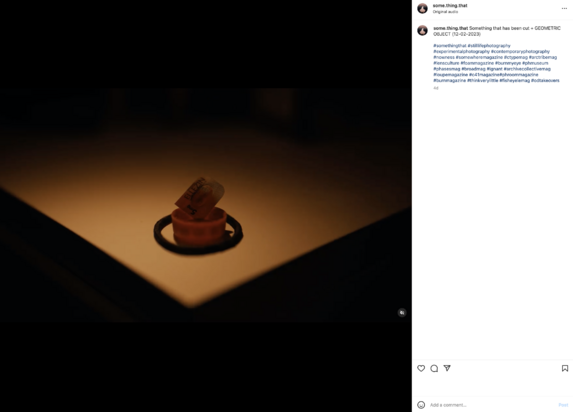
#SomethingThat #Everyday #Today #Routine #Disciplinary #PassageofTime #StillLife #MundaneObject
Text References
Fisher, M. (2014). Ghosts of my life: Writings on depression, Hauntology and lost futures. Zero Books.
Foucault, M. (1995). Discipline and punish: The birth of the prison. Vintage Books.
Pulver, A. (2016, April 12). Apichatpong Weerasethakul: 'my country is run by superstition'. The Guardian. Retrieved March 8, 2023, from https://www.theguardian.com/film/2016/apr/12/apichatpong-weerasethakul-cemetery-of-splendour-thailand-interview
Saybasili, N. (2008). Borders and ghosts: Migratory hauntings in contemporary visual cultures (thesis). Goldsmiths' College.
Artworks
Ai, W. (1995). Study of Perspective. photograph.
Hsieh, T. (1980). One Year Performance 1980-1981.
Kawara, O. (1966). Date Paintings.

